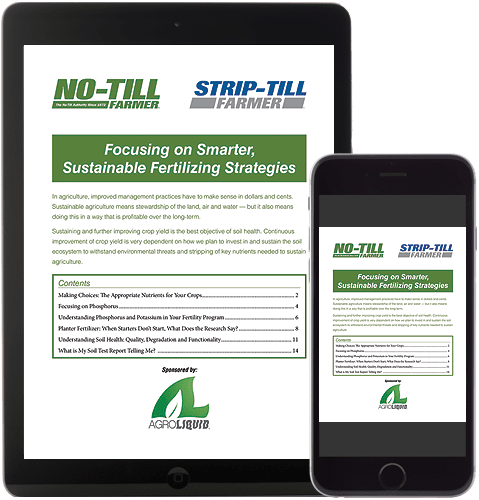
Learn strategies and best practices for investing and sustaining your soil’s ecosystem to improve crop yields while withstanding environmental threats and stripping of key nutrients.
Dear No-Till Farmer,
As you know, in agriculture, improved management practices have to make sense in dollars and cents. Sustainable agriculture not only means stewardship of the land, air and water, but it also means doing this in a way that is profitable over the long-term.
Sustaining and further improving crop yield is the best objective of soil health. In this FREE eGuide, you’ll discover smarter, sustainable fertilizing strategies that will help you identify how much nutrition is already available in your soil so that you can plan and optimize your fertilizer applications.
Download “Focusing on Smarter, Sustainable Fertilizing Strategies” for FREE and see how you can plan and optimize your fertilizer applications to improve crop yields and protect your soils.
Key topics included in this FREE eGuide include:
- Making Choices: How to Determine the Appropriate Nutrients for Your Crops Through Soil Testing
- Focusing on Phosphorus: Best Practices for Apply and Managing P
- Understanding Phosphorus and Potassium In Your Fertility Program
- Planter Fertilizer: When Starters Don’t Start, what Does the Research Say?
- Understanding Soil Health: Quality, Degradation and Functionality
- What is My Soil Test Report Telling Me?
Plus, hear from Dr. Jerry Wilhm, senior research manager of AgroLiquid as he shares research findings from their 1,000-acre North Central Research Station, which is focused on crop nutrient research.
Download this eGuide TODAY to gain a deeper understanding of how to plan and execute your fertility program for sustainable growth.
You’ll learn about…
4 Considerations When Deciding Whether Starter Fertilizers are the Right Choice for your Farm
- Choose Your Weapon - Just like everything in agriculture, there is not a “one size fits all” approach to starters. Some fertilizers are “commodity” types that are commonly available, but can vary in price and quality (some good, some not-so-good).
- Know Your Target - You don’t use just any herbicide on all of your fields and hope it takes care of the weeds you have. You select what fits your needs. The same should apply to starter fertilizers.
- Make the correct diagnosis and take a complete soil test – If you are going to fertilize for a specific nutrient shortage, make sure it’s the right one.
- Take advantage of in-furrow placement for more than just N-P-K - At the NCRS, it has shown a starter fertilizer shouldn’t be expected to work without needed micronutrients.
If you know where you are and where you want to go with yields, then after reading this eGuide, you’ll be armed with the knowledge you need to choose the right starter program for your farm.
Download “Focusing on Smarter, Sustainable Fertilizing Strategies” for FREE and see how you can plan and optimize your fertilizer applications to improve crop yields and protect your soils.
Plus, you’ll gain a deeper understanding of how phosphorus (P) and potassium (K) fertilizers interact with other inputs and elements in the soil to help you decide which inputs and application timings will best suit your particular operation.
Don’t delay – download this FREE eGuide and learn strategies and best practices for investing and sustaining your soil’s ecosystem to improve crop yields while withstanding environmental threats and stripping of key nutrients.
Yours for better no-tilling,
No-Till Farmer * Conservation Tillage Guide * No-Till Insider
What new insights did you gain from this report? What jumped out at you?
Share your observations below.


